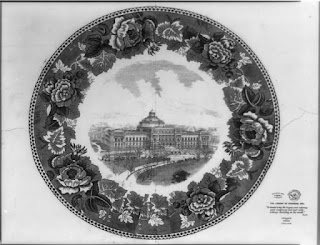Today is the birth anniversary of pottery founder Josiah Wedgewood. Here are 10 things you might not know about him:
- He was born in Burslem, Staffordshire.
- Josiah Wedgewood was the eleventh and youngest child of a potter named Thomas Wedgwood and his wife, Mary, so pottery was in his blood. Josiah was proving himself to be a skilled potter by the age of nine.
- However, a bout of smallpox left him with a weakened knee, which meant he could no longer operate a potter's wheel, so he had to turn to designing pottery for other people to make.
- He also studied chemistry in order to understand how clay and glazes and fire actually worked. This meant he could develop new and different glazes so his designs stood out from everyone else's. One of his innovations was a pyrometer, a device to measure the temperatures in kilns during the firing of pottery. For this, he was elected to the Royal Society in 1783.
- There seemed to be a fair amount of inbreeding in his family. In 1764 Wedgwood married Sarah Wedgwood, his third cousin. Their daughter Susannah married Robert Darwin and became the mother of the English naturalist Charles Darwin, who would later marry Emma, who was the daughter of their son, Josiah Wedgwood II, his first cousin.
- Wedgewood's pottery soon became known and desired in high places. Queen Charlotte ordered a range of pottery from him, he persuaded him to let him name that line "Queen's Ware". Anything Wedgwood made for the Queen was automatically exhibited before it was delivered.
- Later on, Catherine the Great ordered the Frog Service from Wedgwood, which consisted of 952 pieces and over a thousand original paintings, for her holiday home, the Kekerekeksinen Palace (which means palace on a frog swamp in Finnish). More recently, a 1,282 piece Wedgewood dinner service graced The White House during President Roosevelt’s time in office, and was used for the banquet to celebrate the coronation of Queen Elizabeth II.
- Josiah had one particular obsession in his work and that was to make a good replica of the Portland Vase, a Roman cameo glass vase, dating back to between AD 1 and AD 25. He eventually produced what he considered to be a satisfactory copy in 1789.
- A visit to the Port of Liverpool brought his attention to the horror and cruelty of the slave trade, after which he became an abolitionist. He went on to produce an anti-slavery medallion depicting a slave in chains and bearing the words "Am I Not a Man and a Brother?" which was the most famous depiction of a black person in 18th century art.
- He died in 1795 aged 64.
My Books:
If you like stories about:
- Superheroes
- Psychic detectives
- Romance
- Alternative dimensions
- Time travel
- Secrets
- Friendship
- Family relationships
- Ghosts
- Adventure
- Crime
If you want to read about superheroes who aren't the usual Marvel/DC staples, who don't all live in the USA.
If you like quirky tales.
If you like to support independent self published authors.
If you like stories about:
- Superheroes
- Psychic detectives
- Romance
- Alternative dimensions
- Time travel
- Secrets
- Friendship
- Family relationships
- Ghosts
- Adventure
- Crime
If you want to read about superheroes who aren't the usual Marvel/DC staples, who don't all live in the USA.
If you like quirky tales.
If you like to support independent self published authors.


No comments:
Post a Comment